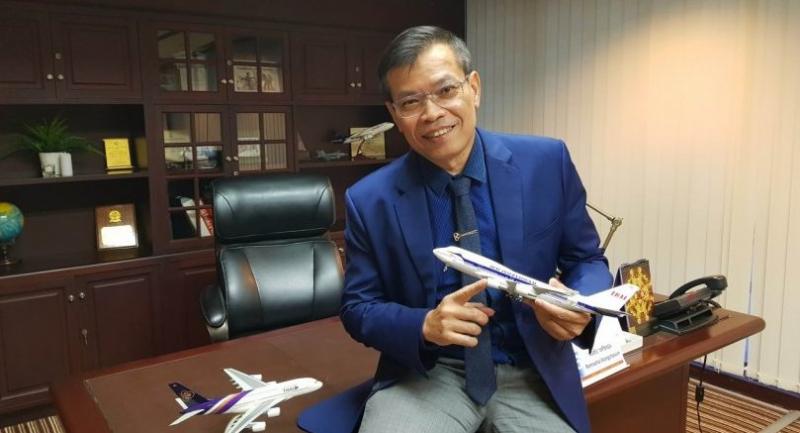THAI bets big on maintenance hub

A PLAN by Thai Airways International (THAI) for a showpiece aircraft maintenance centre in the Eastern Economic Corridor (EEC) – intended to cement the country’s status as a regional aviation hub – is edging closer to reality, with a feasibility study due to be completed this month.
The project for the aircraft maintenance, repair and overhaul (MRO) centre at U-Tapao International Airport is being led by the national carrier, which will operate the facility in a joint venture with a yet-to-be selected aircraft manufacturer.
Planned to open in 2022, the so-called MRO Campus is billed as a world-class facility that will further entrench Thailand’s standing as an aviation hub in the region and help propel the development of the flagship economic zone that hosts it.

Ronnachai Wongchaoum, vice president of the TG MRO Campus Project Office Department at Thai Airways International Plc (THAI), said the airline expected to submit the feasibility study for the project to Prime Minister Prayut Chan-o-cha by this month or the next. Prayut, who chairs the Eastern Economic Corridor Management Committee, would decide whether to approve the project in principle.
“We want to develop the No 1, world-class MRO centre, which will be the best in terms of on-time and on cost considerations, as well as on quality,” Ronnachai said.
Occupying a 210-rai plot, the MRO Campus will require investment of about Bt11 billion, with Bt7 billion earmarked for construction and the rest for equipment. The design work is scheduled to start from June and will take about one year, before construction can begin.
The MRO Campus will be owned and invested in by the Royal Thai Navy under a right granted by the Treasury Department. The campus will be operated by THAI and the joint venture partner under a leasing contract of 50 years.
The MRO Campus will open officially in June or July 2022, and employ between 500 and 800 workers, including technicians. The maintenance centre will have a capacity to handle between 50 and 80 heavy maintenance events annually.
The centre’s payback period will be between five and 10 years when annual income is forecast to reach Bt3 billion. The MRO Campus’ annual income from aircraft maintenance services is expected to exceed Bt22 billion within the next 50 years. U-Tapao airport itself is expected to attract an increasing number of visitors, jumping from around 30 million a year now to 60 million in the next five years.
“We (THAI) have already approached the biggest of the two major aircraft manufacturers to become our joint venture partner in the MRO Campus project in U-Tapao,” Ronnachai said.
“We have got a positive response from a European company that is looking for a prime location in Southeast Asia to set up a maintenance, repair and overhaul centre. For us, we would like to have technology transfers and customers from the aircraft maker.”
“We need to find an aircraft manufacturer as our joint venture partner so as to benefit from the transfer of maintenance technology and management know-how.”
Ronnachai said the envisaged 50:50 joint venture agreement between THAI and the plane maker that will emerge as its partner in the MRO Campus project is expected to be signed by the end of this year.
He said that the aircraft maintenance business in the Asia-Pacific region shows strong growth potential, driven by an increasing number of aircraft in the region, including those being operated by the major airlines.
There are about 20,000 aircraft in operation globally and the number will increase to 35,000 within the next 20 years, according to predictions from the big major aircraft manufacturers.
“There are also 6,139 aircraft being operated in the Asia Pacific, including China. In the next 20 years, 14,276 new aircraft will be added into the region,” Ronnachai said.
“Meanwhile, about 3,438 existing aircraft will be discharged from the Asia Pacific region in the next 20 years. As a result, the actual number of aircraft operated in the region, including China, will be 16,977 in the next 20 years.”
Ronnachai said that each aircraft will have a lifetime of between 24 and 30 years on average, and are typically operated by premium airlines for the first 12 years before they are sold to other airlines or air service providers. Each aircraft will see about four to six years of operations before entering major maintenance. Each round of such maintenance would cost about Bt25 million, Ronnachai said.





